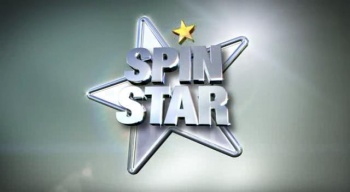Spin Star
Contents |
Host
Broadcast
Initial West for ITV1, 10 November to 19 December 2008 (30 episodes in 1 series)
Synopsis
Six contestants, one Bradley Walsh, a giant lever, and The Moneyspinner, a computer-generated slot machine. Welcome to the world of ITV daytime circa 2008.
Each day, someone will have the opportunity to take home a tidy payout. Or, if their luck is out, absolutely nothing. New contestants are always called Daily Players, not to be confused with any other lottery game. They start at the far end of the row, move up by one position each day, so that by their sixth recording, they're that day's Spin Star, and are playing for the cash.
Round one is the Quick Spin round, and there are five computer-generated wheels in play. The first has a specific question category - Action Figures or Hats, for instance. It also gives the difficulty, easy, medium, or difficult. The next three wheels contain each of the five main players twice, and the final wheel has amounts of money ranging from £500 to £4000.
A questions is asked to each of the Daily Players named on the middle wheels on the subject shown on the left, and if they give a correct answer, they get the money from the rightmost wheel put into their bank. An incorrect answer adds nothing to their personal bank, which has been spotted with £500 to start with. And, if the same Player appears on all three reels, it's a JACKPOT!!!, and they're playing for double money. Repeat this three times, then take a commercial break.
In round two, the more things change, the more they stay the same. The subjects are different, and the cash prizes have increased to a top prize of £10,000. New to the subject reel is a "Brain Buster", a really difficult question. And appearing on the cash reel is a "Bank Buster"; if the contestant gets the question wrong, their bank is reduced away to nothing.
Just to add a little spice, after the original spin, the contestant is allowed to re-spin some or all of the reels, with two restrictions; they're not allowed to spin only one reel again, it has to be none or two. Also, the "Brain Buster" and "Bank Buster" can't be re-spun. The combination of the two can prove toxic. Again, three spins of this takes us into the commercial break.
At the end of round two, the Daily Players have finished their work. The amount in their banks is frozen, and their names represent that much money.
The final round is dragged out for all it's worth. The player spins the question reel, and must answer a question on the subject (at the level of difficulty). Get the question right, and the one "Bank Buster" is removed from the first prize wheel; get it wrong, and a second is added.
The contestant then spins the prize wheel, where each contestant's name appears twice, and there are either no or two "Bank Busters". If the wheel lands on a contestant's name, it's good news, the player has won that much money. However, if it lands on a "Bank Buster", the player is wiped out and loses everything so far.
Another question introduces the second prize wheel, which can have either one or three "Bank Buster" spaces afterwards. A final question takes us to the final prize wheel, which has two or four of these "Bank Buster" spots. If the player lands on one of them, then no matter how well they've done in the past, they leave with nothing.
We've described the game in great detail, but we almost needn't have bothered: Spin Star was entirely undemanding, wallpaper television. It's something that filled the screen for three-quarters of an hour, without proving particularly offensive, but without making any claim to originality. Bradley Walsh keeps the game fizzing along at a fine pace, and creates a jolly atmosphere, but even he couldn't hide the fact that it's fundamentally a show of blind luck. And independently adjudicated, as the host pointed out in every second breath. The early editions suffered from some very ropy editing, but this was not a problem after a few weeks.
Prizes averaged £10,000, with a range from nothing to over £30,000. We reckon the maximum possible prize is a shade under £600,000, but this requires so much luck that it's never going to happen. Nor is the board game version, a missed opportunity if ever we saw one.
Theme music
Marc Sylvan
Web links
Discussion of tactics at Bother's Bar (28 Nov 2008)


